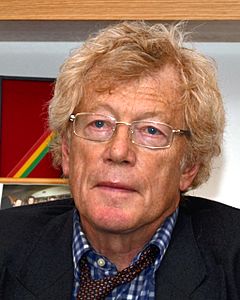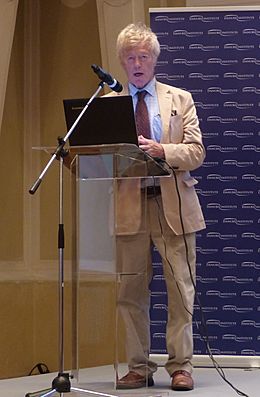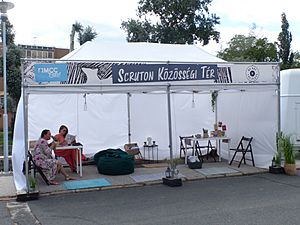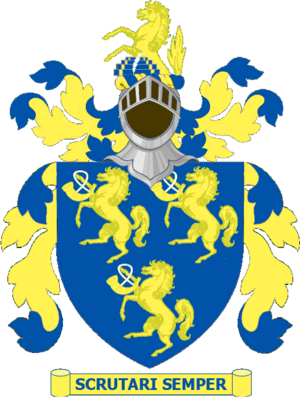Roger Scruton facts for kids
Quick facts for kids
Sir
Roger Scruton
FBA FRSL
|
|
|---|---|
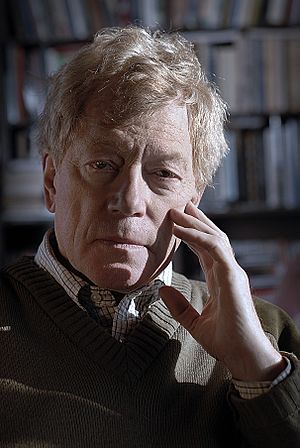 |
|
| Born |
Roger Vernon Scruton
27 February 1944 Buslingthorpe, Lincolnshire, England
|
| Died | 12 January 2020 (aged 75) Brinkworth, Wiltshire, England
|
| Alma mater | Jesus College, Cambridge (MA, PhD) |
| Occupation |
|
|
Notable work
|
|
| Television | Why Beauty Matters (BBC Two, 2009) |
| Spouse(s) |
Danielle Laffitte
(m. 1973; div. 1979)Sophie Jeffreys
(m. 1996) |
| Children | 2 |
| Awards |
|
|
Philosophy career |
|
| Era | |
| Region | Western philosophy |
| School |
|
|
Main interests
|
|
Sir Roger Vernon Scruton (27 February 1944 – 12 January 2020) was an English philosopher and writer. He focused on aesthetics (the study of beauty and art) and political philosophy. He was known for supporting traditional conservative ideas.
From 1982 to 2001, he edited The Salisbury Review, a conservative magazine. Scruton wrote over 50 books on many topics. These included philosophy, art, music, politics, and religion. He also wrote novels and two operas. Some of his most famous books are The Meaning of Conservatism (1980) and How to Be a Conservative (2014). He often wrote for popular newspapers and magazines.
Scruton said he became a conservative after seeing student protests in France in May 1968. He taught philosophy at Birkbeck College in London for many years. In the 1980s, he helped set up secret academic groups in Soviet-controlled Eastern Europe. For this work, he received the Czech Republic's Medal of Merit in 1998. He was made a knight in 2016 for his contributions to philosophy and education.
Contents
Roger Scruton's Early Life and Education
Family and Childhood
Roger Scruton was born in Buslingthorpe, Lincolnshire, England. His father, John "Jack" Scruton, was a teacher. His mother was Beryl Claris Scruton. Roger grew up with his two sisters in High Wycombe and Marlow.
His father came from a working-class background in Manchester. His mother liked romantic stories and polite society. Roger described his parents as having very different ideas about life.
School and University
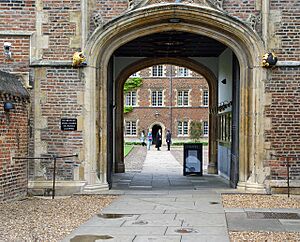
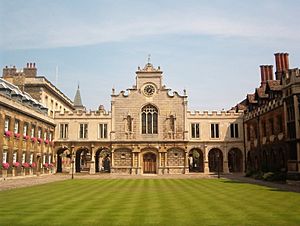
Roger attended the Royal Grammar School High Wycombe. He was very good at science and math. He won a scholarship to Jesus College, Cambridge. When he told his family about Cambridge, his father was upset.
At Cambridge, he first planned to study science. But on his first day, he switched to philosophy. He graduated with top honors in 1965. After that, he taught in France and lived in Rome. He started his PhD at Jesus College in 1967. He became a research fellow at Peterhouse, Cambridge in 1969. It was during a visit to France in 1968, seeing student protests, that he first became interested in conservative ideas.
Career and Activism
Teaching at Birkbeck College
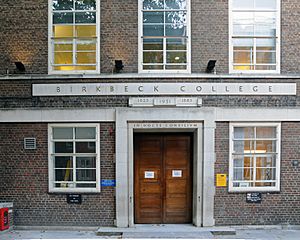
Scruton earned his PhD in 1973. His first book, Art and Imagination (1974), was based on his PhD work. From 1971, he taught philosophy at Birkbeck College in London. This college held classes in the evening for adult students.
Scruton often said he was the only conservative at Birkbeck. His conservative views, especially after his book The Meaning of Conservatism (1980), caused some disagreements with his colleagues. He continued teaching at Birkbeck until 1992.
Editor of The Salisbury Review
In 1982, Scruton became the first editor of The Salisbury Review. This magazine supported traditional conservative ideas. He edited it until 2001. The magazine aimed to give a strong intellectual voice to conservatism.
Scruton believed that editing this magazine affected his academic career in the UK. The Review was critical of many popular ideas of the time. These included nuclear disarmament, extreme equality, and multiculturalism. Scruton often had to write many articles himself, using different names.
In 1984, the Review published a controversial article. It questioned the benefits of multicultural education. This led to strong criticism against the magazine and Scruton. Despite this, Scruton felt it was important to speak the truth. He was later elected a fellow of the British Academy in 2008.
Writing and Columns
The 1980s were a very busy time for Scruton's writing. He published many non-fiction books and his first novel. One of his most debated books was Thinkers of the New Left (1985). This book criticized several well-known thinkers.
From 1983 to 1986, he wrote a weekly column for The Times newspaper. He wrote about music, wine, and other topics. Some of his columns were very controversial. He supported Margaret Thatcher, who was Prime Minister at the time. This support was seen as a betrayal by some university teachers.
Helping Dissidents in Central Europe
From 1979 to 1989, Scruton actively supported people who disagreed with the Communist government in Czechoslovakia. He helped connect academics there with universities in Western countries. He was part of the Jan Hus Educational Foundation.
He and other academics visited cities like Prague and Brno. They smuggled in books and organized secret lectures. They even helped students get a Cambridge university degree in theology. Books were printed secretly, and exams were taken in cellars.
In 1985, Scruton was arrested in Brno and then expelled from Czechoslovakia. He was put on a list of "Undesirable Persons." He was also followed during visits to Poland and Hungary. For his brave work, he received the First of June Prize in 1993. In 1998, the Czech President Václav Havel gave him the Medal of Merit. In 2019, Poland also honored him with a high award.
Later Life and Views
Life in England and the US
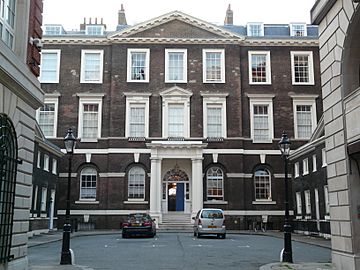
After his work in Czechoslovakia, Scruton returned to England. He later taught philosophy at Boston University in the United States for a few years. While there, he wrote two books: Modern Philosophy: A Survey (1994) and The Aesthetics of Music (1997).
In 1993, he bought Sunday Hill Farm in Brinkworth, Wiltshire. He called it "Scrutopia." In 1996, he married Sophie Jeffreys, an architectural historian. They had two children. For a few years, they also owned a historic house in Virginia, USA, but later decided to live permanently back in England.
Music and Opera
Scruton loved wine and wrote a wine column for a magazine. He was also a composer, even though he mostly taught himself. He wrote two operas. One was called The Minister (1994). The other, Violet (2005), was based on the life of a British musician.
Knighthood and Public Service
Scruton continued to hold academic positions in the UK. He was made a knight in 2016 for his contributions to philosophy and public education. Prince Charles performed the ceremony at Buckingham Palace.
In 2018, he was appointed to lead a British government commission. This group was called the Building Better, Building Beautiful Commission. Its goal was to promote better design in homes and buildings. However, some past comments he made caused controversy, and he was briefly removed from the commission. After an apology from the newspaper that published the interview, he was re-appointed.
Roger Scruton's Philosophical Ideas
Views on Aesthetics and Beauty
Scruton was a very important thinker in the field of aesthetics. This is the study of what makes things beautiful or artistic. He believed that art should be appreciated for its own sake. He wrote several books on this topic, including The Aesthetics of Architecture (1979) and Beauty (2010).
In 2009, he made a BBC Two documentary called Why Beauty Matters. In it, he argued that beauty should be important again in art, buildings, and music. He believed that faith in God could lead to more beautiful architecture, like the city of Venice.
Arguments for Conservatism
Scruton is best known for his writings on conservatism. He admired thinkers like Edmund Burke and T. S. Eliot. His book The Meaning of Conservatism (1980) explained his conservative ideas. He supported Margaret Thatcher, but he also questioned some of her ideas about the free market.
He believed that society is held together by authority and the rule of law. He argued that true freedom comes with obedience to these rules. Scruton also thought that society should respect traditions and institutions. He felt that ignoring the past would give too much power to the present generation.
Scruton believed that some traditional beliefs, even if they seem like prejudices, can be important for society. For example, he thought that modesty in women and chivalry in men could help relationships and raising children. He was critical of some modern feminist ideas but praised earlier suffragists.
In his book A Political Philosophy: Arguments for Conservatism (2006), he argued that people have limited loyalties. He believed that loyalty to one's own country is important for good government. He also said that conservation of resources, including laws and customs, is a key part of conservatism.
He was critical of post-modernism, which claims there is no single truth. Scruton argued that this idea often leads to judging Western culture harshly while accepting other cultures without question.
Monarchy and Religion
Scruton supported constitutional monarchy. He believed that a king or queen helps keep peace and stability. He saw monarchy as something above daily politics.
He was an Anglican Christian. His book Our Church: A Personal History of the Church of England (2013) defended the importance of the Church of England. He believed that humans have a spiritual side. He argued that while reason can help us understand faith, believing in God is also a "leap over reason's edge." He also felt that seeing beauty in nature can help us understand God's presence.
Views on Totalitarianism
Scruton defined totalitarianism as a system where the government has complete control over everything. He argued that such systems often rise from resentment. They try to destroy institutions like law, property, and religion. He believed that revolutions are often started by ambitious leaders, not truly by the people. He also noted that in totalitarian societies, language is used to control thoughts, not to describe reality.
Other Important Views
In 2014, Scruton supported English independence. He believed it would strengthen the relationships between England, Scotland, Wales, and Northern Ireland. He was also a strong supporter of Brexit (Britain leaving the European Union). He felt that the EU threatened the UK's independence and national identity.
Awards and Recognition
For his work helping dissidents in Czechoslovakia, Scruton received the First of June Prize in 1993. In 1998, the Czech President Václav Havel gave him the Medal of Merit (First Class).
In the UK, he was made a knight in 2016 for his contributions to philosophy and education. His family joined him at the ceremony at Buckingham Palace.
In 2019, the Polish government awarded him the Grand Cross of the Order of Merit of the Republic of Poland. Later that year, the Czech Parliament gave him a Silver Medal. Hungary also honored him with the Hungarian Order of Merit.
 1998: First Class of the Medal of Merit of the Czech Republic
1998: First Class of the Medal of Merit of the Czech Republic 2015: Knight Bachelor
2015: Knight Bachelor 2019: First Class of the Grand Cross of the Order of Merit of the Republic of Poland
2019: First Class of the Grand Cross of the Order of Merit of the Republic of Poland 2019: Commander's Cross with Star of the Hungarian Order of Merit
2019: Commander's Cross with Star of the Hungarian Order of Merit
Death
Roger Scruton was diagnosed with cancer in July 2019. He passed away on 12 January 2020, at the age of 75. Many important people shared their sadness and praised his work.
British Prime Minister Boris Johnson called him "the greatest modern conservative thinker." The Chancellor of the Exchequer, Sajid Javid, highlighted Scruton's work behind the Iron Curtain. Nobel Prize winner Mario Vargas Llosa described him as "one of the most educated people I have ever met." He said Scruton was a "humanist in the classical style."
Other friends and colleagues also spoke of his kindness and intelligence. His funeral was held on 24 January 2020 at Malmesbury Abbey. He was buried in the Abbey's churchyard.
Selected Works
Nonfiction
- Art And Imagination: A Study in the Philosophy of Mind (1974)
- The Aesthetics of Architecture (1979)
- The Meaning of Conservatism (1980)
- A Dictionary of Political Thought (1982)
- A Short History of Modern Philosophy (1982)
- Thinkers of the New Left (1985)
- The Aesthetics of Music (1997)
- On Hunting (1998)
- An Intelligent Person's Guide to Modern Culture (1998)
- Animal Rights and Wrongs (2000)
- England: An Elegy (2001)
- Beauty (2009)
- I Drink Therefore I Am: A Philosopher's Guide to Wine (2009)
- The Uses of Pessimism: And the Danger of False Hope (2010)
- Green Philosophy: How to Think Seriously About the Planet (2011)
- Our Church: A Personal History of the Church of England (2012)
- How to Be a Conservative (2014)
- Fools, Frauds and Firebrands: Thinkers of the New Left (2015)
- Music as an Art (2018)
Fiction
- Fortnight's Anger: a novel (1981)
- Notes from Underground (2014)
- The Disappeared (2015)
Opera
- The Minister (1994)
- Violet (2005)
Television
- Why Beauty Matters (BBC Two, 2009)
Images for kids
See also
 In Spanish: Roger Scruton para niños
In Spanish: Roger Scruton para niños
- Animal rights#Roger Scruton
- Oikophobia#Political usage
 | William M. Jackson |
 | Juan E. Gilbert |
 | Neil deGrasse Tyson |


